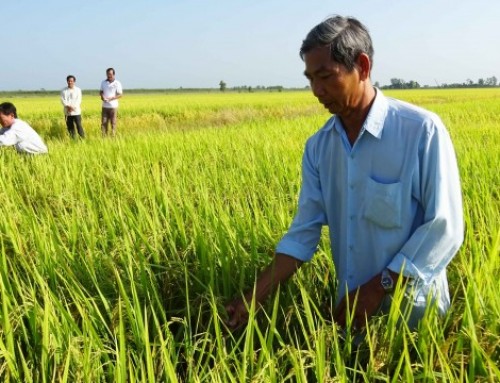Vegetable growers trapped in the pesticide treadmill

A story reflecting the life of growers, their fears and their hopes
When vegetable grower Khanthong Kasemviriyanont sees pest, she gets panic. She gets afraid her vegetables will not look ‘good’ and a trader will offer to buy them a low price. Her immediate solution is spraying chemical pesticides.

Trader hires cutters to collect vegetables at the farm
“I don’t know what to do. I don’t have other options. I need to sell vegetables and if there are a lot of holes on the vegetables, the trader will not take the vegetables or buy them at very low price,” says Ms. Kasemviriyanont, who is a vegetable grower for over 20 years in a Central province, Thailand.
Ms. Kasemviriyanont, 41, has been using chemical pesticides since she became a farmer. Today she has experienced breathing difficulties. “Of course, I am scared. There is something wrong with my breathing. Also, I just heard that a man whose job was spraying chemicals died recently [due to chemicals inhaling]. The only option I have is to wear protection gear when spraying chemicals.”
Ms. Kasemviriyanont says she uses a lot of chemicals on her vegetables especially during what she perceives as outbreaks. She spends about 10,000 to 20,000 Baht for chemical fertilizers and pesticides for every vegetable growing, which usually last about one or two months. She says all vegetable growers she knows do the same thing.
“Maybe instead of asking me why I am using chemicals, you may wish to ask consumers why they only choose to buy ‘nicely looking’ vegetables,” says Ms. Kasemviriyanont.

Cutting vegetables
Vegetable trader Chamnean Buacheen who comes to buy Ms. Kasemviriyanont’s vegetable at the farm gate says he only wants to buy the vegetables that look nice.
“If there are worms on vegetables or holes on the leaves, I will offer a lower price,” says Ms. Buacheen, 42, who has been buying vegetables directly from the growers during the past 20 years.
He continues that: “The vegetables have to look clean and nice. Otherwise, I cannot sell them to the market. Sellers only want to have vegetables without pests and diseases because they think those are what consumers want.
“The situation has always been like this since the past 20 years in business,” he says.
Mr. Buacheen is also a vegetable grower himself and he thinks that for getting nicely looking vegetables he needs to apply heavy loads of chemical pesticides.
“Personally, I am scared when eating vegetables and try to wash them carefully before I eat them. However, this is the way it has been for growers ever since. We use chemicals. They kills pest. We can sell vegetables,” he says.
Kannika Toutiem, 42, a vegetable cutter, says the cutters do not eat the vegetables they cut.



“We usually observe chemical pesticide residues on the vegetables we cut, sometimes conspicuously green round spots on them,” she says.
Ms. Toutiem also grows rice and cassava. She says she does not use chemical pesticides on her crops because she only produces them for consumption in her family, not for sale. She says the rice growers in her area all use pesticides in rice.

Soon to be transported to buyers
After talking to them, in their views chemical pesticide appears to be their only option for growing crops. Dr. Thomas Jaekel, a chief technical advisor of ASEAN Sustainable Agrifood Systems (ASEAN SAS) says: “The views of the three farmers exemplify quite well their belief system of why and how in using synthetic pesticides. Their views also reveal the myth and the overuse of pesticide has taken a firm grip on the way how farmers produced their crops.”
The farmers say they are interested in healthy alternatives of crop production including the use of biocontrol pest product but only if the pest can be controlled properly at a manageable cost particularly during what they perceive to be pest outbreaks.
“I don’t want to risk my health. And if there are other options, I would like to try,” says Ms. Kasemviriyanont, “But at the end of the day I need to sell my vegetables. I need a new trader [market]. The groups of traders I have been selling vegetable to do not make a difference whether I use the chemical pesticides or biological products. They are not giving me a better price,” she says.
Mr. Buacheen says he also wants to try biological crop protection but he wants to be sure that it is effective. “I am afraid that biological pesticides cannot control pests in commerce vegetable growing. I am afraid that if it fails, I would lose my investment. So I stick with the same old way of using chemicals for now,” he says.
ASEAN Sustainable Agrifood Systems (ASEAN SAS) has been conducting field trials on the use of biological crop protection in comparison with application of chemical pesticides. The field trials have been conducted in Chiangrai in 2014 and currently ongoing. The recent field trials on the use of biocontrol agents in controlling flea beetles in Chinese cabbage were conducted in Kanchanaburi, Thailand from May to June this year. The objective is to demonstrate the use of biocontrol agent is beneficial for farmers and provides them with the crops that satisfy their needs and expectation.
ASEAN SAS supports effective and environmentally friendly crop production solutions while promoting economic advantages in the value chain that guarantee food safety and security in the region.
Story and photos by Rojana Manowalailao, ASEAN Sustainable Agrifood Systems (ASEAN SAS)





